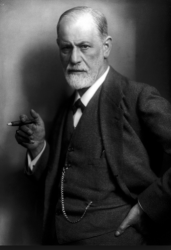Psychoanalysis finds the root of the problem. A person will learn how the history and genesis of his/her life’s experiences have led them to this emotional place. Actually changing one’s base behaviors takes time. Analysis helps to assess and understand the foundational issues and can actually change that person’s behavior going forward. It is a long-term commitment but the rewards are exponential.
For psychoanalysis to work, the patient must settle in, trust the therapist and trust the process of analysis. This allows the mind to relax and open. It is from this open flow that analysis takes place. When the mind is relaxed it bounces from topic to topic, thought-to-thought, fragment to fragment. It is within these fragments of thought that the person’s root issues begin to be identified.
With the help of a trained analyst, a patient’s fragments connect, and the ‘Ah-ha Moment’ is achieved. Ah-ha moments are the reason for living. There is no greater gift or feeling of satisfaction than gaining a new piece of understanding. It’s like a drug; you will want more. If a person is willing to immerse themselves in the therapeutic process by committing to weekly or bi-weekly sessions and by being as honest and as thorough as possible when reporting their story (without editing) then with time, that person will achieve mental health.
Psychoanalysis requires a steady, consistent effort. If a person can do this it will open the door to a future they only dreamed of having. Finding inner peace, balance, and the ability to live life in the moment are only a few of the benefits gained through analysis.
It is often disturbing to people when they begin psychoanalysis that the analyst says very little. You lie there, staring the wall, seemingly talking to yourself. This feels odd initially. You free associate. You drift between topics. You cry. You tell involved detailed stories. You comment and criticize. You question and cry some more. You sometimes feel embarrassed. You sometimes feel silly. You often feel anger and rage. But you talk. And talk. And talk. The analyst listens. And listens. And listens.
The analyst will prompt you when you’re blank or question you for better understanding. You will feel that you want a response from him/her. This is normal. He/she are purposely not interrupting your stream of consciousness to listen very specifically for nuances in your ‘report.’ You may feel that you are repeating the same thing over and over about situations, complaints or troubles with people. This is not only normal it is necessary. It is in the re-telling of the story with subtle prompting from the analyst that nuances are found that help to connect the dots and piece together the root causes of the issues.
Most people begin analysis for specific reasons. They usually seek help when the emotional pain or confusion in their lives is so great that they must take action. A traumatic event is also a catalyst to begin. No type of analysis is a quick fix. A half dozen sessions may help with a specific issue, but it is the commitment of time that brings the greatest long-term benefit. There is no shame or weakness in it. In fact, it takes an incredible amount of strength to face and fix emotional problems. Only the most courageous people do analysis.
Analysis is cumulative. It is experiential learning at it’s best. It builds on itself. Remember, you are embarking on a lifetime’s journey of gaining an education unlike anything you have ever learned before. It can only be delivered one spoonful at a time because that is the maximum dose the human mind can take.
By the time you reach therapy or analysis, you’ve had many years to produce protective, defensive layers around your ego. Analysis will root out those protective defenses and release the confusion they’ve created giving new balance and clearer understanding of the situations and people in your life. Human beings are complex creatures however ah-ha moments are very clear and simple.
Analysis helps to root out these foundational and long-term behaviors by breaking down and examining, from both macro and micro perspectives, the events and people in your life, from birth to the present day. This, however, is not done in a chronological sequence. Your daily life, its experiences and relationships, will trigger memories bringing forth people and events from various stages of your childhood and adolescent life. You will assess and analyze these situations, large and small, and how you have responded. You will report and analyze what you know of your parents, grandparents, aunts, uncles, brothers, sisters, friends, teachers, bosses, co-workers, and all their lives. You will bring to the couch any person(s) that affects or has affected your life and the negative and/or positive experiences you have had of them.
If ten people experience the same event, there will be ten very different reports of that event. Analysis is not about placing blame. It is not about pointing a finger. You are not airing dirty laundry to make someone look bad or try to ‘win’. It is about gaining a new emotional intelligence and enlightened understanding to live a better happier life. It is about how to better navigate your life and understand how to do it better the next time. You will feel better. You will feel calmer. You will be more stable. You will be wiser. You will be more content. You will stop ruminating and losing sleep. You will stop writing the script for relationship conflicts. This all takes time, but it is time well spent.
Is is said that if a person does analysis, he/she affects two generations back and three generations forward. Now that’s a long term, positive investment.
Analysis is the single, most interesting thing you will ever do for yourself; and it is the greatest, single gift you can give to the people you love. It is quite simply, a fantastic expansive and mind-blowing experience.
